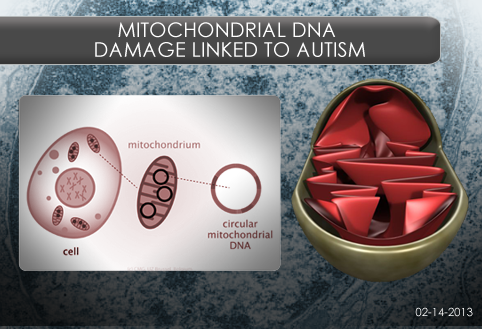Check out other stories from the Latest News
Mitochondrial DNA Damage Linked to Autism
By Stacy W. Kish on February 14, 2013

Background: Mitochondria, the powerhouses of the cell, have a set of DNA separate from the DNA in a cell’s nucleus. Some mitochondrial DNA codes for enzymes involved in energy conversion. During this conversion, reactive oxygen species (ROS) are produced that can cause damage to the cell, especially to the mitochondrial DNA. Few studies have examined mitochondrial DNA damage in children with Autism Spectrum Disorder (ASD), even though ROS production is reported to be higher in these children.
What’s new: A group of scientists at the University of California, Davis examined mitochondrial DNA (mtDNA) damage in autistic and typically developing children and their parents by direct sequencing of selected regions of their mitochondrial DNA. The participants were recruited from the CHildhood Autism Risk from Genes and Environment study (CHARGE).
The researchers found evidence of increased mtDNA damage in children with autism. The children appear to inherit mtDNA template damaged by oxidative stress from their mothers. In addition, the children may inherit a susceptibility to mtDNA deletions from their fathers, but fathers do not pass mtDNA to children.
Why it’s important: The amount of mtDNA damage in children with autism is similar to that of an older person. How environmental factors that contribute to increased mtDNA damage combine with genetic susceptibility to mtDNA deletions is an important area of investigation in the search for autism risk factors. This study provides a new line of evidence for the influence of mitochondrial DNA damage in autism.
Help me understand :
| Source(s) : |
| Tweet |

